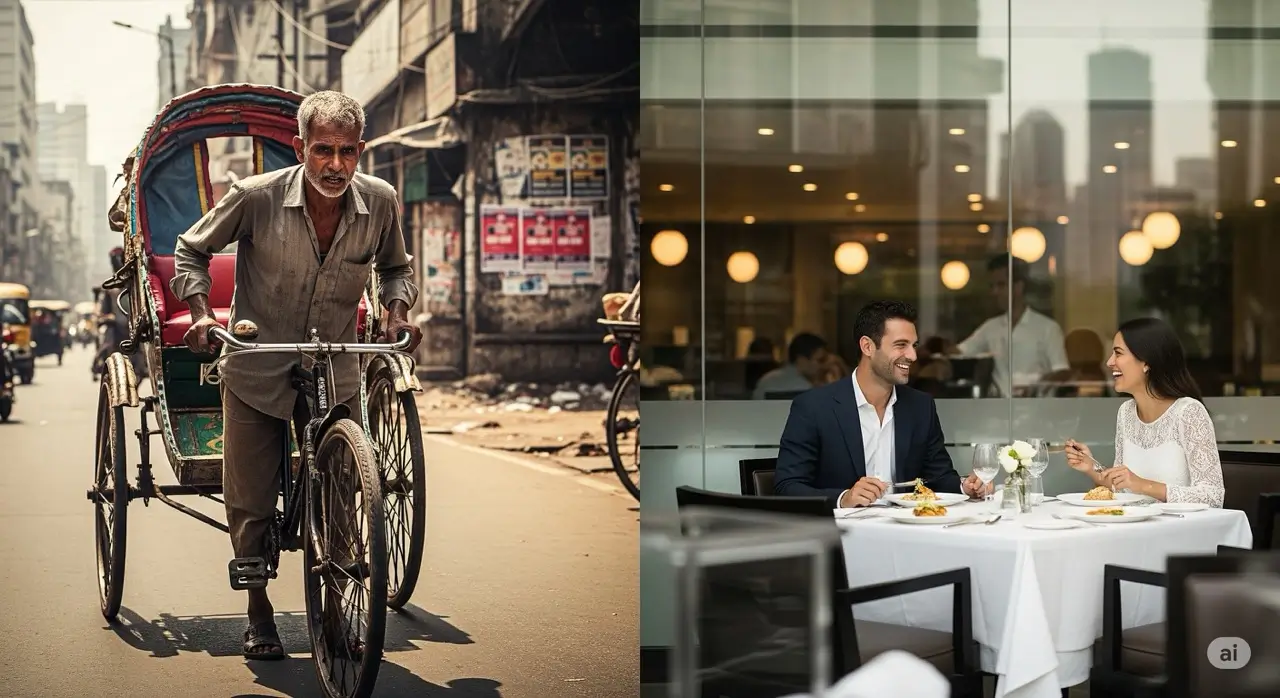A Rickshaw Ride and the Price of Privilege

Yesterday, I watched a movie with a dear one. Then we headed to a posh restaurant in a humble rickshaw. We paid the rickshaw puller 60 taka. We paid the restaurant 1800.
That arithmetic didn’t sit right with me.
One meal, on a whim, cost us what could be at least three days of that man’s income. A man who pulls a rickshaw under 38-degree heat, perhaps while nursing a fever, may be worried about his sick children at home. Yet, there he was, doing what he must. And there we were, doing what we could.
It hit hard and wouldn’t let go: What makes my comfort possible, but keeps him stuck in extreme struggle?
The Question That Wouldn’t Let Go
Many would say, “You’ve earned this comfort. You studied. You worked hard.”
But is it really just that?
Education helps. Yes.
But let’s be real. Sixteen years of education alone doesn’t justify the fact that I can casually spend 1800 taka on a lunch I didn’t need, while he might earn just 600 on a good day.
The truth is – there’s a deeper machinery at play.
More Than Just Money
Pierre Bourdieu, the French sociologist, argued that inequality isn’t just about wealth. It’s also about something he called “capital”, but not just the money kind.
There’s:
- Economic capital: Obvious – money, property.
- Cultural capital: How you speak. What you know. What you’ve been exposed to.
- Social capital: Who you know. Who can help you. Who picks up your call.
So while I had access to books, tech, maybe coaching and inspiration, he might’ve had none. Not because he didn’t want it, but because the system made sure it was never available.

Bourdieu’s point? We don’t start the race at the same place. And some of us get better shoes, maps, and even cheering crowds. The rickshaw puller and I – we didn’t just land on different rungs of society by chance. We started from different lines. And those starting lines were drawn long before we were born.
The Illusion of Choice
Who doesn’t know about Amartya Sen, the Nobel-winning economist? He talks about capabilities, not just what you have, but what you’re able to do with what you have.
Give both of us 500 taka. I might use it for learning, networking, or convenience. He might need it for medicine, food, or rent to the slumlord who lets his family sleep under a roof. We have the same money, but completely different choices.
Sen would argue that real freedom means having the ability to make meaningful choices. The rickshaw puller doesn’t lack freedom because someone’s locking him up. He lacks it because poverty quietly erases options.
How Power Hides in Everyday Life
Another Michel Foucault, the philosopher of hidden systems, argued that power isn’t only in politics or institutions. It’s in the ordinary, the unnoticed. It lives in our daily routines, social norms, school curricula, workplace rules, and even the language we use. It shapes not only what we do, but what we believe is possible for us to do.
The rickshaw puller may never even question his life. Not because he accepts it, but because he’s been silently told: “This is your place.”
That’s not divine destiny. That’s deep conditioning by invisible systems – education systems, labor markets, media, and even how neighborhoods are designed.
This Isn’t Fate. It’s Design.
So what are we really looking at?
Not a gap in effort. Not a difference in morals. Not a punishment or a reward.
We’re looking at a structure. A design.
A world where some are born into ladders, and others into cages.
The rickshaw puller and I didn’t earn or deserve our starting lines. We just inherited them. But from that moment onward, everything from our possibilities, opportunities, and even how we see ourselves began to diverge.
That’s not fate. That’s not just hard work.
That’s the system. And it’s worth questioning.
Can we truly envision a world where starting lines are a little bit fairer, and if so, what will it really take to get there?
Photo by Braden Collum on Unsplash
